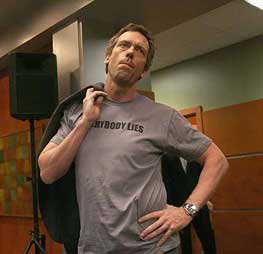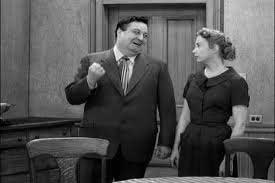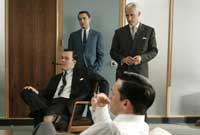
Tom Yellin, co-founder of The Documentary Group, used to produce the ABC News Peter Jennings Reporting specials, among other fine programs. His latest project, created with director Lloyd Kramer and others, is America in Primetime, the four-part PBS documentary series premiering Sunday at 8 p.m. ET (check local listings).
I'm so impressed with this study of television that I wrote about it HERE, reviewed it on this website HERE, and on Friday broadcast a review of it for NPR's Fresh Air with Terry Gross, which you can read and hear HERE.
But even that wasn't enough, so I phoned Yellin (seen at left in the photo at the top of this column, along with America in Primetime interview subjects Felicity Huffman, star of of ABC's Desperate Housewives; Phil Rosenthal, co-creator of CBS's Everybody Loves Raymond; and Showtime's Nurse Jackie creators Linda Wallem and Liz Brixius) earlier this week to ask him some specific questions about how, exactly, he could make such a good TV show about TV, when almost all of them end up being so painfully bad...
How much knowledge did you presume that your audience would bring to it?
That is a great question -- and we didn't know how to deal it. To me, when I was thinking about doing this, the thing I didn't know how we would wrestle with is, 'Okay, what if you've never seen Breaking Bad? What do you do?'
What I thought was that we would find ways to convey basic expository information along the way. Maybe we'd put in pop-up captions, and we asked every creator and every actor, 'Tell us about your series in two sentences' -- so we had that to work with. And we even considered a narrator, although that wasn't something we wanted.
But eventually, we came to the realization that if what we're focusing on is the character as opposed to the show, you can get away without people knowing. So it is important to know who the character is, and what role the character's playing. If you've never watched The Sopranos, you can still 'get' Tony, is the way we sort of thought of it.

And it became really stark to us, this question of 'How much knowledge do people have?,' when we contemplated an international audience for this. Even the most popular shows on network television -- such as House, that's huge, it gets what, an 8 [rating]? Eight percent of the country watches it on a given week? No one knows these shows. No one knows anything.
Let's assume no one knows anything, and see if we can make it work by focusing on the characters...
And if you notice, we cut out all the stuff where people say, 'My favorite moment was when,' and 'I really loved this,' and 'He's such a great writer because.' All that is out, and people are just speaking about the craft, and about the character.
But where you keep it in -- I did notice there wasn't any self-referential back-slapping, but what I loved was when you'd have the producer of one show...
...Talk about another show! There you go! Yes!
And that's one thing you hardly ever see, and it's talking about these television shows as a canon, and a shared vocabulary. And I loved that.
Exactly. And that was very purposeful. That was something we wanted to do from the beginning. Like the thing when [TV writer-producer] Tom Fontana starts doing the 'socks' bit from All in the Family? Priceless! It's like, 'Oh my God. He really watched it, he paid so much attention! And then you cut to the scene...'
[And here it is, in full, courtesy of YouTube:]
By the way, that's one of the two clips I've chosen for my Fresh Air review.
And like David Chase talking about David Lynch, saying 'I bow down to that' [regarding Lynch's way with a dream sequence]. And that's what happens. It's a creative community that's paying attention to what's happening at the high end.
There are times where you allow your experts with equal weight to disagree. In the middle of all these people talking about TV being so novelistic, you have David Chase popping up and saying, 'Well, what's so great about more time?' That's another conscious choice you made. So, why?
Because creative people do disagree. And we felt these people should speak for themselves. The fact that there is creative tension around these big issues, like whether television is better or worse than movies, is interesting to us...
And in covering the topic of television, to mix comedy and drama so intentionally and directly -- I haven't seen that before.
We felt it was essential to do that. And in fact, when I was trying to convince David Chase to do this -- people he works with were kind enough to put me in touch with him -- he's just like he seems. 'Hi. Whaddya want?' [Yellin laughs.]

And I'm talking to him, and I said, 'We were interested in archetypes, and Man of the House is an important archtype we think Tony embodies -- two really important strains of that character. On the one hand, as a sort of father figure who's in control, and wants to manage everything, and always has the answers. On the other hand, he's this guy who's out of control, like Ralph Kramden in The Honeymooners. We think there's a direct line there.'
And he said, 'Who told you to say that?' I said nobody. He said, 'Well, what are you talking about? Are you going to mix comedy and drama?' And I said, 'We don't think the genre is what's important. We think the character's important, and characters in both comedy and drama share these same qualities. They're just expressed a different way.
And then he went on to tell me this whole story about Tony and The Honeymooners, and this thing you see in the show -- and then I knew we had him.
It's important to demonstrate that an archetype can play either form. And another thing David Chase said to me -- he always thought of The Sopranos as a comedy. He said, 'We always played it as a comedy. We went for the jokes, whenever we could find them.'
Writer-producers of quality TV shows really can talk, and think, and they're so seldom asked to.
There is no question that great writing is the foundation of great scripted drama. What we found is, these writers have never been asked why they do what they do, how they do what they do, what they're trying to accomplish, what their frames of reference are, what work they look to to draw inspiration from, how this stuff comes out of their own lives, what the intersection is between their work and the culture in which they're living, and so on.
And when you start asking those questions, you just get these wonderfully thoughtful and provocative answers. I mean, David Milch -- [and Yellin just laughs].
How did they react to you and your team while you were doing the interviews?

The short answer is, it was kind of like the Telephone game, where you get this person, and they call that person. We interviewed over a period of six months. Norman Lear is someone I know, and I sort of made him go first. And then he called [Mad Men creator] Matthew Weiner, and Matthew Weiner did it. And it was okay for him, and so he called [Mad Men star] Jon Hamm -- and it was like that...
The fact that it's on PBS, which allows you to get clips without having to pay for them in a way that would make it prohibitive in other venues -- how crucial is that?
That's essential. There is no possibility this program could have been done at any other venue. Unless you're willing to pay literally millions more dollars -- and even then, I'm not sure that NBC would agree to give you their material, if it were going to appear on CBS... I have to say, we've gotten extraordinary cooperation from all of the networks and production companies.
And also, I think there is a role for PBS, in being a kind of mediator of a lot of things in this country, including culture. And this feels like that's the role for PBS. PBS doesn't do a lot of its own scripted drama that's original. It does a lot of things that are imported -- and whether that's a good or bad thing is another question.
But it gives PBS the sort of 'Switzerland status' that is required for this to work...